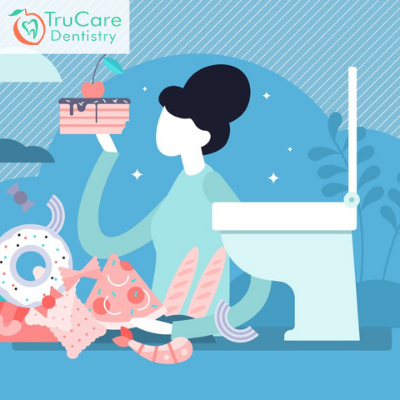
When it comes to the list of life-threatening eating disorders that can badly impact the patient’s oral health, bulimia nervosa easily makes it in the list of top five.
What is bulimia nervosa?
Often referred to as a severe eating disorder, the medical condition affects individuals in their early adulthood. The patient experiences an irresistible urge to eat, then gains weight and starts facing irrational fear due to a sudden increase in weight. After feeling sick due to overeating, they try self-induced vomiting, excessive exercises, and fasting to reduce weight. They also use other methods of purging, like using laxatives. Such an eating disorder often results in oral pain and causes dental injuries.
Patients who purge due to bulimia often develop alcoholism, depression, anxiety, and other medical conditions. The medical condition affects millions of individuals in the United States each year. Studies point out that roughly three out of 100 women suffer from the same at some point in life.
Besides dental issues, the other most noted symptoms in these patients are swelling in salivary glands, chronic sore throat, red and dry tongue. They may develop severe complications like gastrointestinal disorders, dehydration, irregular menses or amenorrhea, and even heart arrhythmias.
Victims of sexual or physical abuse and persons born with genetic vulnerability are prone to bulimia nervosa.
Bulimia leads to deterioration of oral health
Due to the connection between dental health and body, dentists can quickly point out the side-effects of overeating and purging habits. Depending on the severity of the problems triggered due to bulimia nervosa, your dentist can recommend treatment to restore gum tissues and damaged teeth.
Teeth get exposed to a lot of acids due to the patient’s overeating and purging habits. Thus, visiting the dental clinic for cleaning sessions during the treatment period remains crucial. Cleaning tartar and plaque helps gum tissues to recover soon.
Unfortunately, patients fail to understand that rinsing the mouth with soda and water after a purge can prove to be a bad idea. Prescription-strength toothpaste and in-office fluoride treatment can help in remineralizing the teeth and controlling decay. Dental care professionals also advise patients not to brush every time after they purge while recovering from bulimia as stomach acid passing through the mouth while vomiting can etch on the enamel. Brushing the teeth with the presence of such acid can harm the enamel.
Once the purging habit is under control, dentists recommend implants, veneers, crowns, fillings, and other options to fix erosion. Taking care of oral hygiene and keeping your mouth hydrated is vital for ensuring the early recovery of salivary glands during the treatment. For preventing more problems, the dentist may recommend the use of mouthguards, chewing gum, cheese, and antacids.
Such persons may also suffer from depression, anxiety, alcohol abuse, etc. So, the patient must share details of medications that they are consuming for controlling side-effects of bulimia. Your dental professionals will prescribe medications accordingly. Sharing this information with the dentist is crucial as alcohol may interfere with certain medicines.
Treating Bulimia Nervosa
Harvard’s study has pointed out the condition is challenging to diagnose as most patients overeat and purge in private. They often maintain an average weight as they get rid of the excess calories with the compensatory behavior.
Treatment for bulimia nervosa includes a combination of cognitive-behavioral therapy, nutritional counseling, and dental restoration procedures for bringing oral health back on track. The goal during the treatment is to address psychological problems, treat medical complications, and restore normal eating behavior. So, several types of clinicians are involved.
In some cases, the damage caused due to purging and binging is so severe that dentists may recommend teeth extraction and replacing the same with dental bridges to restore oral health. Depending on the symptoms, your dental office may offer nutritional counseling and recommend a psychotherapy specialist for cognitive behavioral therapy (CBT). Prozac (fluoxetine) is the most recommended, and FDA approved medication for eating disorders. Sertraline (Zoloft) may also be recommended for adults.
Home-based care after restorative procedures
Patients are advised to ensure they brush their teeth twice a day with prescribed toothpaste. Cleaning the space between the gum line and teeth with a piece of floss is necessary. Using a fluoride mouthwash for rinsing the mouth after a purge can be helpful. Rinse the mouth with water even after a small meal consisting of sugary food items or drinks. Patients should consider visiting their dental office first so that the expert can address oral health issues that cause pain or sensitivity. Work with a reputed dentist to protect your teeth from further damage. If you are searching for Roswell (GA) based best dental care clinic for bulimia nervosa induced damage to teeth, you should fix an appointment at TruCare Dentistry.
